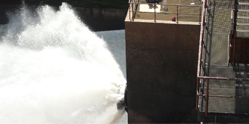
In spite of inadequate water, irrigation activities are fast gathering momentum among rural communities of Katsina State, North West Nigeria. Economic constraints have now forced farmers into exploiting every source of water in their vicinity for dry season farming. Produce like carrot, Irish potato, cucumber and cabbage are being cultivated in villages surrounding Katsina.
Danladi Ibrahim, a farmer in Gidan Sukola, Bakori LGA said for dry season farming, they relied on River Yar’gauta to cultivate vegetables such as; onions, lettuce, cabbage, sugarcane and cassava. “We cultivate crops that require less water, such as, cabbage and onions because the river we depend on recedes in early February. Cabbage in particular is easy to produce, especially if you have sufficient urea fertiliser and pesticides,†he said. “At its initial stage, cabbage requires urea fertiliser at least four times in its three months’ life span and application of pesticide at least once in every three days of its early stage of growth,†he stated, adding that they buy seeds from the open market in Bakori, Funtua and sometimes Zaria. Another farmer in the village, Malam Rabo Dare, said the growing interest in irrigation farming in the village has surpassed the capacity of the small river they depended on.
“There is need for government or private companies to address the problem of water by establishing boreholes to support the river we are using. Water constraint is limiting our capacity to produce vegetables in large scale,†said Rabo Dare. He explained that they produce sugarcane and cassava in large quantities especially as the two crops require only damp and cool soil to grow. “Because we cannot produce much tomato or Irish potato, we resorted to the cultivation of sugarcane and cassava.
“They take much of our time but their water requirement is only at the initial stage; once they shoot up they are bound to survive,†he further explained.
He said beside their village, there are many others in the district that are into irrigation farming using rivers close to them. Dauda Sule, a large-scale farmer in Tsiga, told this reporter that there are many villages, such as Unguwar Kanawa, Barebari and Gwamutsawa, that are producing vegetables in large scale courtesy of their small rivers. “Many of us now explore opportunities in irrigation farming which in the past was left to the selected few who operated only at irrigation dam sites,†Sule said.

